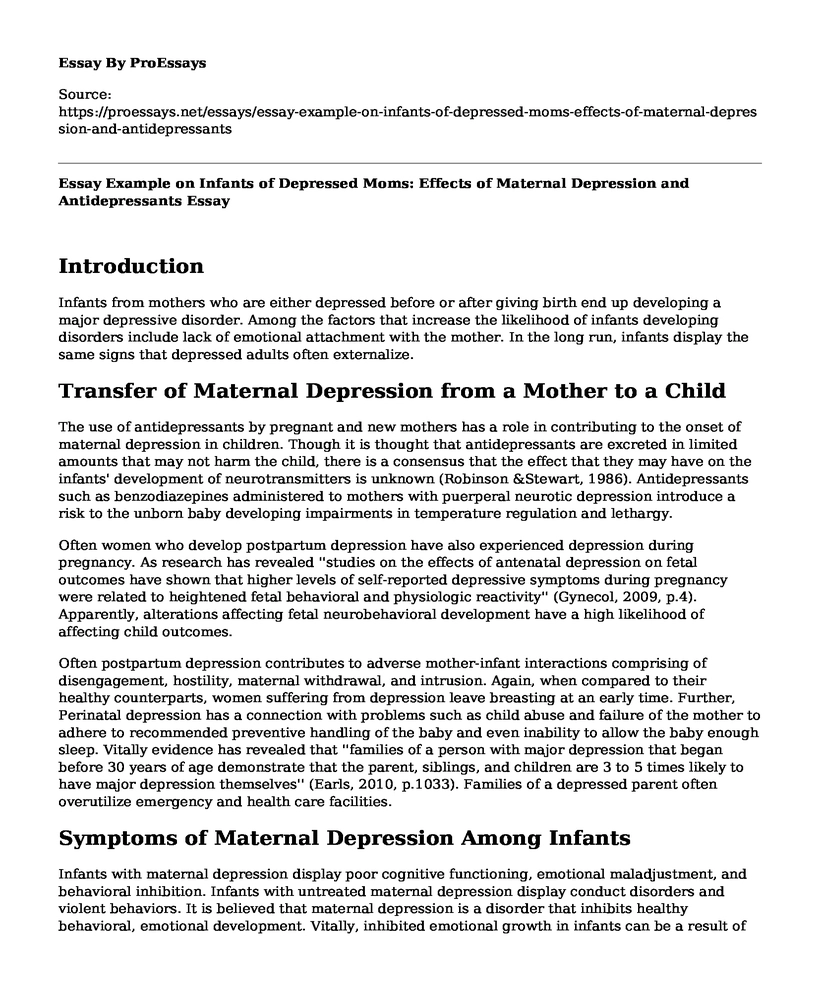Introduction
Infants from mothers who are either depressed before or after giving birth end up developing a major depressive disorder. Among the factors that increase the likelihood of infants developing disorders include lack of emotional attachment with the mother. In the long run, infants display the same signs that depressed adults often externalize.
Transfer of Maternal Depression from a Mother to a Child
The use of antidepressants by pregnant and new mothers has a role in contributing to the onset of maternal depression in children. Though it is thought that antidepressants are excreted in limited amounts that may not harm the child, there is a consensus that the effect that they may have on the infants' development of neurotransmitters is unknown (Robinson &Stewart, 1986). Antidepressants such as benzodiazepines administered to mothers with puerperal neurotic depression introduce a risk to the unborn baby developing impairments in temperature regulation and lethargy.
Often women who develop postpartum depression have also experienced depression during pregnancy. As research has revealed ''studies on the effects of antenatal depression on fetal outcomes have shown that higher levels of self-reported depressive symptoms during pregnancy were related to heightened fetal behavioral and physiologic reactivity'' (Gynecol, 2009, p.4). Apparently, alterations affecting fetal neurobehavioral development have a high likelihood of affecting child outcomes.
Often postpartum depression contributes to adverse mother-infant interactions comprising of disengagement, hostility, maternal withdrawal, and intrusion. Again, when compared to their healthy counterparts, women suffering from depression leave breasting at an early time. Further, Perinatal depression has a connection with problems such as child abuse and failure of the mother to adhere to recommended preventive handling of the baby and even inability to allow the baby enough sleep. Vitally evidence has revealed that ''families of a person with major depression that began before 30 years of age demonstrate that the parent, siblings, and children are 3 to 5 times likely to have major depression themselves'' (Earls, 2010, p.1033). Families of a depressed parent often overutilize emergency and health care facilities.
Symptoms of Maternal Depression Among Infants
Infants with maternal depression display poor cognitive functioning, emotional maladjustment, and behavioral inhibition. Infants with untreated maternal depression display conduct disorders and violent behaviors. It is believed that maternal depression is a disorder that inhibits healthy behavioral, emotional development. Vitally, inhibited emotional growth in infants can be a result of unfavorable back to the pregnancy period.
Depressed infants display impaired social interactions. Vitally they are likely to exhibit less attachment to the mother. Research has revealed that ''as early as two months of age, the infant looks at the depressed mother less often, show less engagement with objects, has a lower activity level, and has poor state regulation'' (Earls, 2010, p.1033). Depressed infants create an environment where it is difficult for the mother to intervene in their recovery process.
Infants belonging to mothers who have postpartum depression often display outcomes of sleep problems, temperamental difficulties, and excessive crying. A study of six hundred infants has shown that regulation difficulties manifest in children who are as young as one month (Gynecol, 2009). Reportedly, infants from depressed mothers show more significant self-regulation inabilities, stress levels, and heightened arousal compared to infants from healthy mothers.
Effects of Maternal Depression in Infants
Untreated maternal depression often contributes to impaired child development. Brain development processes among infants, such as neuronal migration and pruning, are guided by genetics and the child's environment. A child living in a neglected environment typical with mothers having postpartum depression are likely to have adverse changes in the brain (Earls, 2010). The persistence of maternal depression either due to lack of treatment or any intervention from the mother, mainly where their issues of the child avoiding attachment with the mother often make the infant depression less responsive to any intervention that comes at a later time.
References
Earls. M. (2010). Clinical report-incorporating recognition and management of perinatal and postpartum depression into pediatric practice. American Academy of Pediatrics, 125(5)
Gynecol, A. (2009). Postpartum depression. National Institute of Health. 200(4). 357-364.
Robinsom, E. & Stewart, D. (1986). Postpartum psychiatric disorders. P.31-36
Cite this page
Essay Example on Infants of Depressed Moms: Effects of Maternal Depression and Antidepressants. (2023, Feb 21). Retrieved from https://proessays.net/essays/essay-example-on-infants-of-depressed-moms-effects-of-maternal-depression-and-antidepressants
If you are the original author of this essay and no longer wish to have it published on the ProEssays website, please click below to request its removal:
- Suicidal Crime Paper Example
- Why Children Should be Given Less Homework Essay
- Existential Therapy Essay Example
- Essay Example on Obama Care in Texas: Potential Issues and Challenges
- Essay on the Impact of Emotional Mood on Working Memory and Executive Control
- Paper Example on Calorie Restriction Beats Exercise for Weight Loss: Studies Show
- Essay Example on Women's Health: A Growing Concern Worldwide







